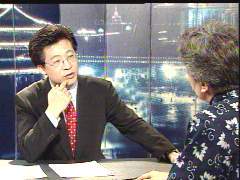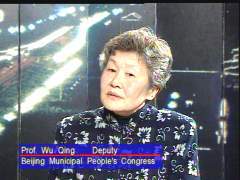 Y: Yang Rui Producer and Regular Presenter of ‘Dialogue’ Y: Yang Rui Producer and Regular Presenter of ‘Dialogue’
W :Wu Qing Professor of English at Beijing Foreign Studies University
Y:A major event in China’s political life each year should be the annual plenary session of National People’s Congress and Chinese People’s Political Consultative Conference. The press will give extensive coverage on congressional hearings and ensuing deliberations by participants. But how do the country’s top legislature and top advisory bodies operate? How do ordinary Chinese exercise their constitutionally guaranteed rights? Joining us now for today’s topic is Prof. Wu Qing from the Department of English, Beijing Foreign Studies University. She’s deputy to both the Beijing Municipal People’s Congress and the People’s Congress of Haidian District. Welcome to “Dialogue”.
W: Thank you.
Y: Is political participation a common practice for ordinary Chinese today?
 W: I think it is. But then it all depends. It depends on where the constituents are, how much education they have had and how much they know about democracy.
W: I think it is. But then it all depends. It depends on where the constituents are, how much education they have had and how much they know about democracy.
Y: When you mention “education”, do you mean formal education like how many years of schooling you’ve had, or education for some specific purpose, like the education on how to vote, for instance?
W: I think general education is important to begin with. People have to be educated so that they can have a strong sense of participation. Then they also need to know enough about the political system of China so that they will know how to function.
Y: As deputy to the people’s congress at two levels, what have you done to let people have a better idea of our political system?
W: First of all, I represent the people of the university I work at. So the constituents are college students, professors, and the staff. As a people’s deputy I often report to my constituents. I read them articles from the Constitution. Article No.76 of the Constitution says that representatives of NPC should keep a close contact with the people who have voted him or her in. So I give them reports and tell them how I have functioned at different sessions, what I support, what I oppose, and what I have done for them.
Y: How do you see democracy in China?
W: I think democracy also means participation, that is, participation of people at different levels. Since we are a people’s country and people’s government, I think government officials as well as governments at different levels should really represent the interests of the people. And government officials should really act as civil servants. At least they should have that kind of awareness. In saying this I mean there’s a lot to improve on the part of our governments at different levels but on the other hand I’m quite optimistic about this because the governments at different levels are getting more and more responsive to the needs of the people. And besides, government officials are changing. They are becoming younger and better educated.
Y: Do you think this process of democratization has anything to do with the current economic development in our country?
 W: Yes, I think so. With the change from planned economy to market economy, people are becoming more aware of their individual rights and they begin to demand that their rights be guaranteed.
W: Yes, I think so. With the change from planned economy to market economy, people are becoming more aware of their individual rights and they begin to demand that their rights be guaranteed.
Y: We know that the people’s deputy ID card is a symbol of a deputy’s responsibility and power, have you ever used yours in a practical situation?
W: Yes, one example is that I used my card to stop a car that belonged to a high-ranking army officer. The car was driving into the bicycle lane at the time. Seeing that, I used my bicycle to stop the car because I felt I had the responsibility to protect ordinary citizens. So I produced my deputy ID card and said to the driver that he should stop and back out of the lane because the lane is for cyclists. And then this driver, a young man, got out of the car and swore at me, “Are you asking for trouble or what, old woman?” Later I filed a formal complaint in which I noted down the plate number of the car and described what had happened. About a month after that I got a phone call from an army officer, presumably the owner of the car. He said he wanted to come over to apologize and he did. And then two weeks later I got a call from that driver. He came over and pleaded with me to remove that line of his swearing from my complaint saying that otherwise he would have to leave the army and go back to where he came from. I told him, “Well, young man, I can’t do that, it’s not right for you to ask me to remove that line for that would mean I was slandering you.” But I did write a letter to that officer saying that I hope this young man would not be demoted from the army as a punishment. Young people sometimes make mistakes and they need a chance to correct their mistakes.
Y: Has there ever been a moment of difficulty or pressure for you while acting as a people’s deputy?
W: Yes, I think so. In 1998 at the first session of the 8th Beijing Municipal People’s congress I was the first person to cast two against votes and two abstention votes.
Y: Did you do it by way of ballot box?
W: Not really. We had to make a show of our hands. So there was great pressure. I cast two against votes because I found there were government officials on the committee of the People’s Congress. Government officials are executives so they cannot act as supervisors at the same time.
Y: How would you comment on the functions of the National People’s Congress, our top legislature? Do you think it is a kind of rubber stamp?
W: I think it’s improving. But I think there is more room for improvement. Actually I think the whole political system is improving because people at the grassroots level are placing higher demands on their representatives. They want them to function, they want them to supervise. They don’t want them to act as a kind of puppet.
Y: Is it likely that high-ranking officials would be dismissed from office if they fail to win the support of the deputies of the people?
W: I think they should.
Y: What do you mean by “should”? Do you mean that it hasn’t been practiced yet?
W: Well, so far there haven’t been any examples.
Y: Some people think American democracy is closest to what democracy really means. Do you agree? Do you think we should follow the American style of democracy?
W: I don't really think so. Ten people might have ten different definitions of democracy. Each country has its own culture and history. We Chinese have our own idea of freedom and democracy, and Americans have theirs. Each has some problems. That’s why we always have to improve.
Y: Samuel Huntington, a professor from the Department of Political Science of Harvard, says that American democracy has a universal appeal. Do you agree?
W: But I remember in the very same paragraph where he said this he also mentioned that culture is a very important factor to think of. Since people have different cultures, naturally there are different patterns of freedom and democracy. I don’t think the American pattern is necessarily the best.
Y: Thank you, Professor Wu, for coming to our program. We welcome our audience to make comments.
|